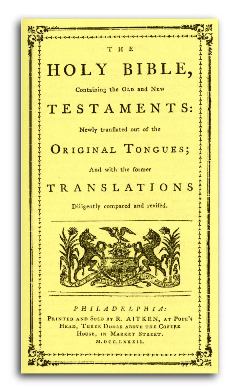Ancient Road Publications |
 |
|
The Bible of the Revolution By Kyle Pope  I n 1782, six years after the signing of the
Declaration of Independence the war wearied colonists who had banned together
to form a sovereign nation found themselves in the midst of a spiritual crisis.
Before the war had begun colonists could easily obtain English bibles through
the Oxford and Cambridge University presses which were under the authority of
the British crown. In the years before the war it had been illegal to print
English bibles without royal authority in order to protect the accuracy of the
sacred text. Yet when the war began and commerce with England was impeded,
shipments of Bibles were stopped. This left the deeply religious patriots, who
in the Declaration itself had affirmed their “...Reliance on the
protection of Divine Providence,” lacking the very source of their
spiritual foundation. The
first step taken to remedy this problem involved the newly formed Continental
Congress. In July of 1777 three Philadelphia preachers placed a petition before
the body bringing the matter to their attention. The petition stated
“...The holy scriptures contained in the old and new Testaments are
growing so scarce and dear, that we greatly fear that unless timely care be
used to prevent it, we shall not have bibles for our schools and families, and
for the publick worship of God in our churches.” In response the congress
first tried to import Bibles from Holland and Scotland. This proved problematic
during wartime. The final solution
came in 1782 when the congress sponsored the first complete printing of the
English Bible on American soil. It
was produced by Philadelphia printer Robert Aiken, and has been known ever
since that time as “The Bible of the Revolution.” One
cannot look back on events such as this and not be touched by the unique spirit
which drove the men and women of the early days of America’s history.
While I would certainly differ with the Calvinistic teachings (on the one
extreme) and Unitarian views (on the other extreme) of these “Founding
Fathers,” at the same time I respect their love for God’s word. A
casual study of literature from this period shows the stark contrast between
the people of that time compared to our own age. The early Americans focused
their spirits on the content of Scripture. Its principles permeated their
language and their treatment of others. America’s sixth president, John
Quincy Adams illustrates this in claiming—“The first and almost the
only Book deserving of universal attention is the Bible.” Such a spirit is sorely needed by men and women in our day. The Bible is not some “outdated relic of antiquity,” it is as relevant to man now as it has ever been! In Scripture we have the mind of God revealed to man giving to us the “words” that will judge us in the Last Day (John 12:48). I ask any who may have questioned the Bible’s importance in your life, give it a second chance! Remember - “The word of God is living and powerful, and sharper than any two-edged sword, piercing even to the division of soul and spirit, and of joints and marrow, and is a discerner of the thoughts and intents of the heart” (Hebrews 4:12 NKJV). |
|
Pope, Kyle. "The Bible of the Revolution" Biblical Insights 8.5 (May 2008): 17 |
|
Home Studies Outlines Photos Graphics Fonts Books Tracts Hymns Contact Us |